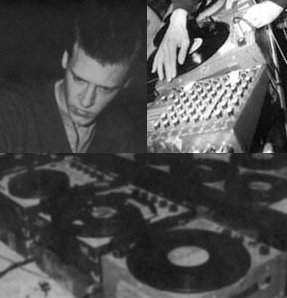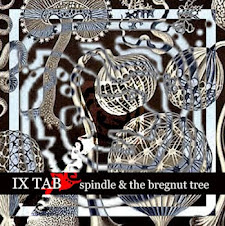Turntablism is a genre out of nowehere, out of nothing. It derives from music splitting itself down the sides and bleeding sub-genres so far and wide that there suddenly becomes a need for unity. It's as relevant a category as Guitarism or Harpism, an absurdity that tries hard to make it work only because it's it assumes that it's proponents feel an affinity with beat, even when some of it's key players dispense with the traditional turntablist sound-blocks and stick with the frills, or the discards or the crackles alone.

When the The Young Gods re-defined a strange, neo-classical guitarless rock by simply stuffing their sampler with inappropriate grooves in 1987 it seemed like the dawning of a genuine new approach to instrumentation and when, later, I discovered that Christian Marclay had already made a career out of fucking with vinyl in an anarchic, situationist, unreasonable way, I realised that he was tugging at the 'pull' of the groove, being deliberately confrontational and iconoclastic in a way that the early James Brown worshipping beat-plugging Hip Hop Djs didn't feel able to do.
Those days ended with Pop Will Eat Itself's prophetic piss-take "Not Now James, we're busy" I reckon he must hear that a lot these days.
What we're left with is a diverse range of turntable artists that make a mockery of the idea of a unifying system, unless the system itself is simply the re-defining of pre-recorded sound - a definition that has to be able to take in Otomo Yoshide, Marclay, Kid Koala, Grandmaster Flash, Philip Jeck and John Cage.
But still, I read articles about Turntablism like a rat attacking a city baby so perhaps this makes it all right? Maybe I've missed the utility of genre somehow?
Damn...
Is this somehow more relevant than Violinism? Does Turntablism relate to a wider aesthetic? Am I treating it as a concrete signifier when I ought to be looking at an implied abstraction?




















5 comments:
you should try some of the mostly unlistenable Milan Knizack recordings from the 60s and early 70s. he was part of the Fluxus group and just loved mucking up vinyl and re-playing it: broken lps stuck back together in the wrong places and with paint added to them... and so on. the true father of turntablism.
amazing post...geezus
im almost inspired to write in my own blog now :)
great post. i'm a huge fan of turntablism - although i think of it as a genre that grew out of technique... maybe like most forms of abstract art... experimentation eventually yielded to a tasty and digestable form... what's also interesting is that its only recently that the hip hop side has acknowledged the existence of the avant garde side and vice versa - i.e. q-bert knows who christian marclay is...
oh that previous post was me - su|www.aumsupreme.com
(am Jemist, hifidelitystylesyahoo.com)
Dig the sentiments entirely. May I add a few cents? Turntablism is essentially part of the sub-genre defying push music continually loves to perpetuate. Throw an artist onto a soapbox, and they're more likely to try and describe their work as 'unique' and thus differentiate their experiences beyond the historical leanings responsible for their artistic upbringing.
At some point in time, the hip hop DJ oddly wanted to seperate themselves from the traditional notion of the DJ + MC mix, step up to the spotlight, sharpen up their skills, and present the music (note: the music) in a form that lay beyond those preconceptions hip hop had portrayed itself as (ie. James Brown beats mixed with the token scratch solo inbetween emcee verses). So, yes, it is a product of evolution, and it needed to step away from it's association with the emcees.
Turntablism is coined by the man responsible for Super Duck Breaks, itself a huge nod to Malcolm McLaren's Buffalo Gals/ Duck Rock effort. Here's what happened: DJs started looking for new sounds and redefine hip hop, and in order to do so, it (the DJs, really) started looking for new sources of inspiration. sounds/ what have you to draw upon. Turntablism is also sadly misrepresented --- any DJ with a Dirtstyle battle record scratching those World Famous Supreme Team samples now became a Turntablist. Is it all about scratching? Is it all about finding those vague dusty pieces of vinyl and constructing a deconstructed melange of samples? Beat juggling? This is again further confused by a new breed of crate diggers using those tools created in the 80s to produce 'instrumental hip hop', armed with SP-1200s and MPCs.
A reminder, and you already hinted upon this: 'Turntablism' was used by Babu to forge an identity for his work on the decks. A reminder that the turntable can be an instrument of its own with an infinite sound bank to work with. It really shouldn't be a genre as much as it is a descriptive element applied to hip hop (I've yet to find true and through examples of non hip hop oriented turntable work, and please notify me if I'm missing out!).
I think that the most concrete example of what Turntablism can create is D-Style's Phantasmagorea = yes, it's hip hop, but it's manipulated solely through a set of PDX-2000s. And the best examples of scratching ever are presented on 'Felonious Funk'. The turntable as an instrument, not as a glorified tool to segue one song into another.
I hate to see the works of DJ Shadow and RJD2 lumped in with 'turntablism', by the way.
Apologies for the comment hijack, I definitely found your post interesting!
[http://www.livejournal.com/users/simplefi]
Post a Comment